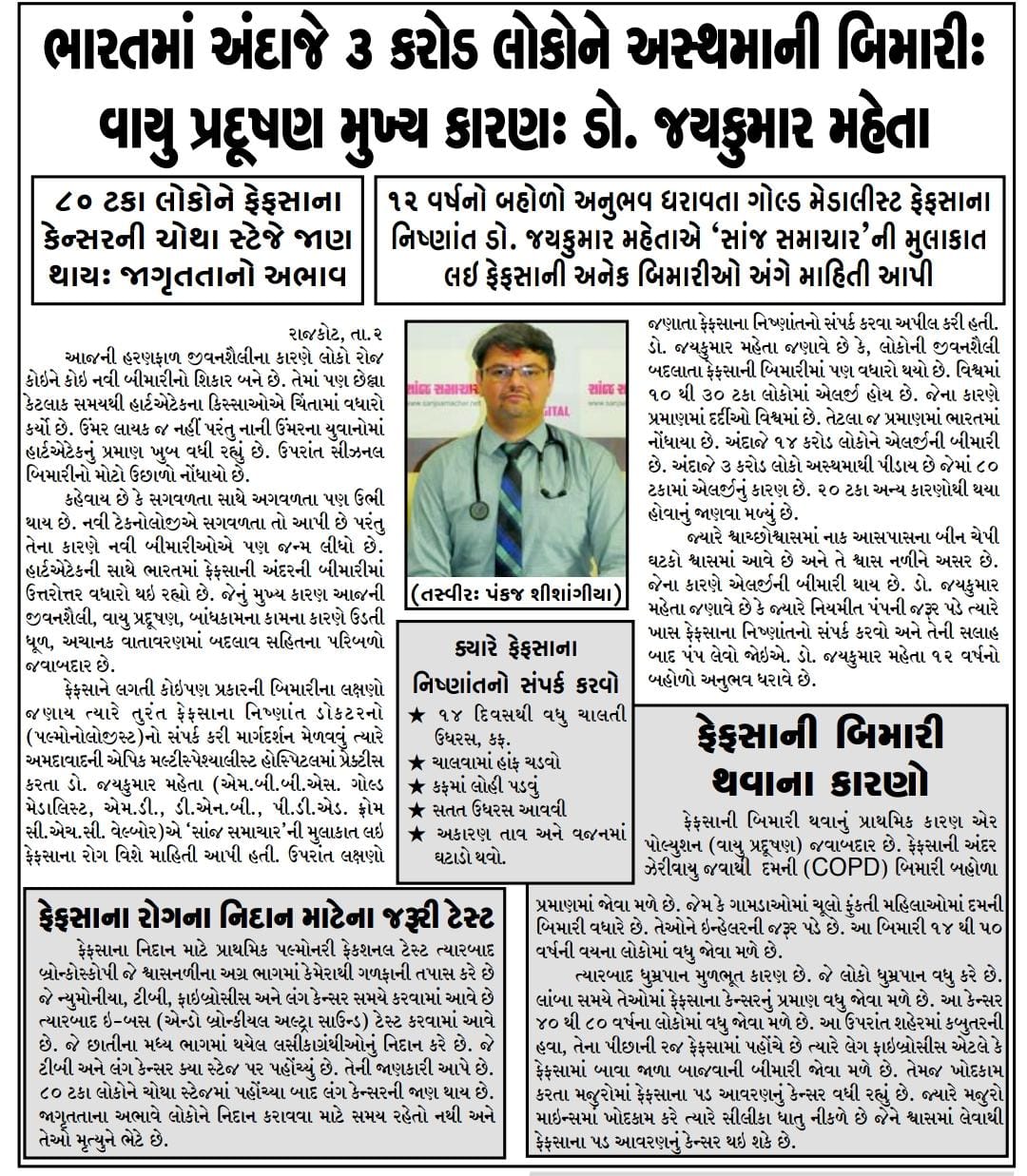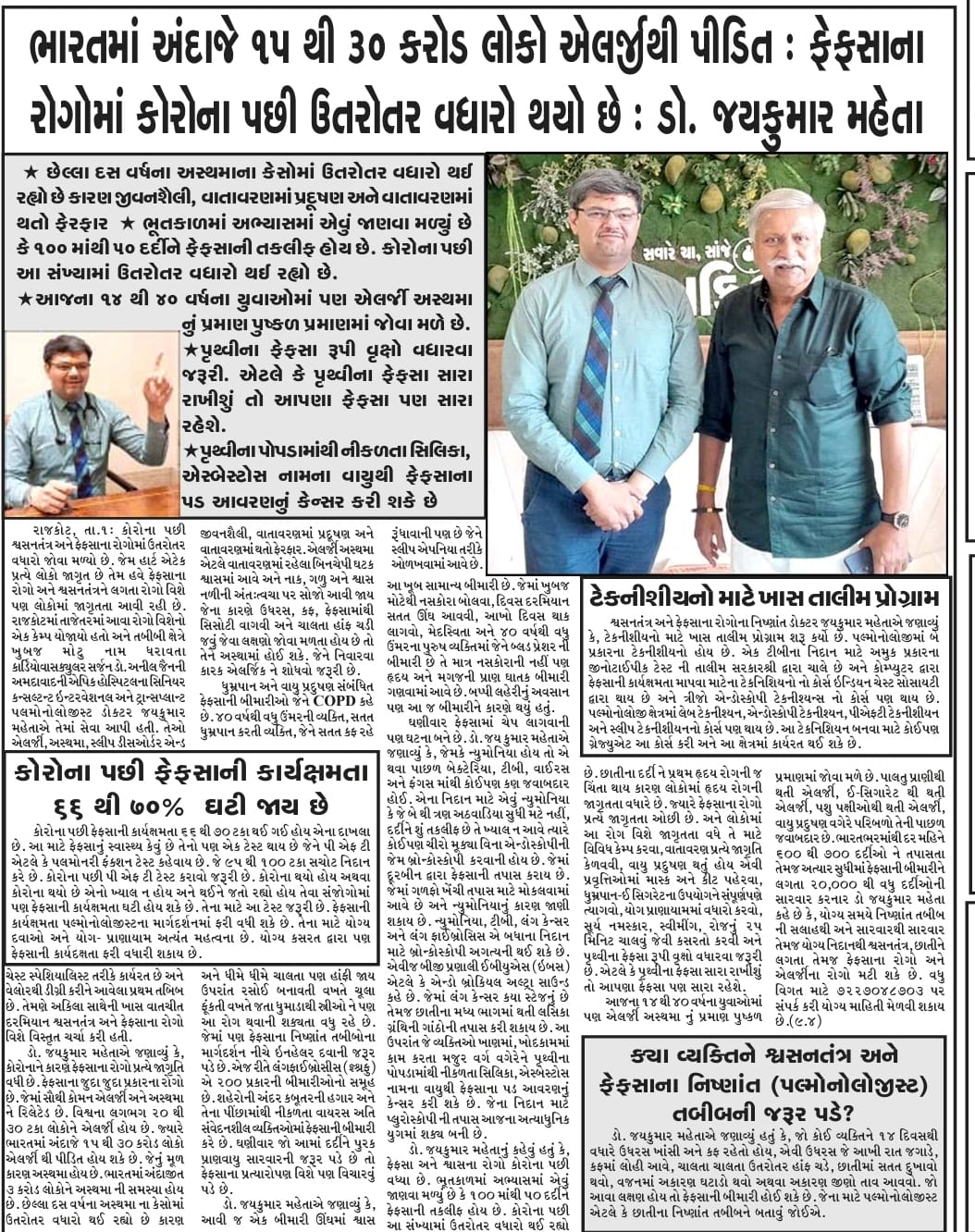Get In Touch
Shop no.3086, 3rd floor-west count, The Retail Park-TRP, Rajyash city, On main BRTS road, Central Bopal, Ahmedabad, Gujarat-380058.
drjaykumar@aksharpulmocare.com drpuja@aksharpulmocare.com
+91 9099 123 163
drjaykumar@aksharpulmocare.com
+91 9099 123 163
 Extreme heat can have significant impacts on lung diseases and overall respiratory health. Here’s a detailed look at how high temperatures can affect individuals, particularly those with pre-existing lung conditions:
Extreme heat can have significant impacts on lung diseases and overall respiratory health. Here’s a detailed look at how high temperatures can affect individuals, particularly those with pre-existing lung conditions:
Impact of Extreme Heat on Lung Health
1. Increased Air Pollution:
- Ground-level Ozone: High temperatures can lead to the formation of ground-level ozone, a harmful air pollutant. Ozone can irritate the airways, exacerbate asthma, and worsen chronic obstructive pulmonary disease (COPD).
- Particulate Matter: Heat often coincides with stagnant air conditions that trap pollutants, increasing concentrations of particulate matter. Inhalation of these particles can cause inflammation and aggravate lung diseases.
2. Dehydration and Mucus Production:
- Dry Air: Hot conditions can dry out the air, making it harder to keep the respiratory tract moist. Dry airways can become irritated and more susceptible to infections.
- Thicker Mucus: Dehydration can lead to thicker mucus, which is harder to expel and can cause blockages in the airways, increasing the risk of infections and exacerbations in conditions like bronchitis and COPD.
3. Increased Respiratory Rate:
- Heat Stress: Extreme heat causes the body to work harder to cool down, often resulting in an increased respiratory rate. Rapid breathing can lead to hyperventilation, which may be particularly challenging for those with respiratory conditions.
4. Heat-Related Illnesses:
- Heat Exhaustion and Heat Stroke: Individuals with lung diseases are more vulnerable to heat-related illnesses. Symptoms like rapid breathing, shortness of breath, and confusion can overlap with those of their underlying conditions, complicating diagnosis and treatment.
5. Indoor Air Quality:
- Air Conditioning: While air conditioning can help reduce exposure to outdoor pollutants, poorly maintained units can harbor mold and other allergens that can affect indoor air quality and trigger respiratory issues.
Vulnerable Populations
- Asthma Patients: Increased temperatures and pollutants can lead to more frequent and severe asthma attacks.
- COPD Patients Those with COPD may experience worsened symptoms due to poor air quality and increased respiratory stress.
- Children and the Elderly: These groups are particularly vulnerable due to their developing or declining respiratory systems.
Mitigation Strategies
1. Monitor Air Quality:
- Check local air quality indices (AQI) regularly, especially during heatwaves, and avoid outdoor activities when pollution levels are high.
2. Stay Hydrated:
- Drink plenty of fluids to keep the respiratory tract moist and help the body regulate temperature.
3. Use Air Conditioning Wisely:
- Ensure air conditioning units are well-maintained to prevent mold and allergens from circulating indoors.
4. Reduce Outdoor Activities:
- Limit physical exertion and outdoor activities during peak heat times, usually between 10 a.m. and 4 p.m.
5. Breathing Techniques:
- Practice breathing exercises to improve lung function and efficiency.
Conclusion
Extreme heat can significantly impact lung health, particularly for those with pre-existing conditions. Understanding these effects and taking proactive steps can help mitigate risks and maintain respiratory health during hot weather.
By:
Dr. Jaykumar Mehta
Sr. Consultant Pulmonologist & Chest Specialist
Akshar Pulmo Care, Bopal & Epic Multispecialty Hospital, Ahmedabad


2023 © Akashar Pulmocare All Rights Reserved.